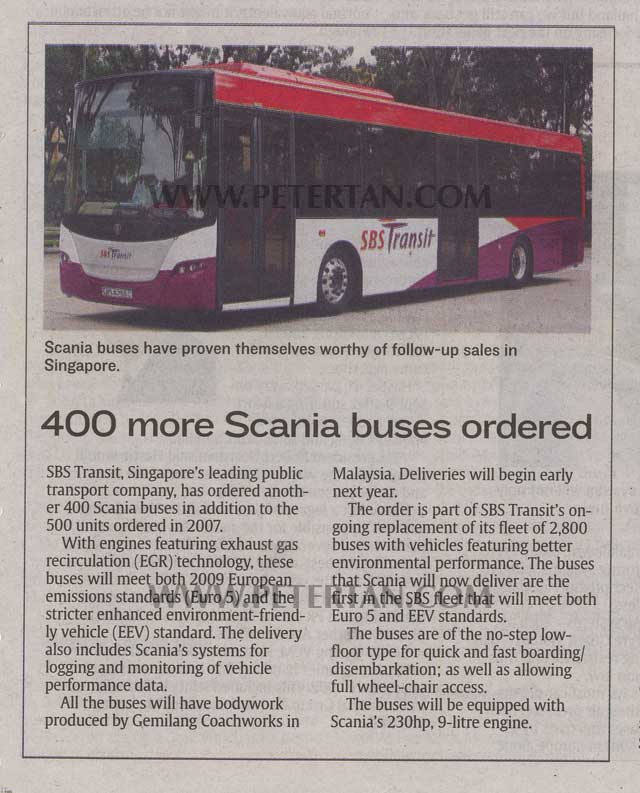Monday February 16, 2009
Buses for the disabledALL the 200 new buses to be added to the Rapid Penang fleet would be disabled-friendly, Second Finance Minister Tan Sri Nor Mohamed Yakcop said.
He said the buses would be delivered by June, bringing the total number of buses owned by the company to 350.
He said the new buses would be fitted with a ramp each to enable wheelchair-bound passengers to board them.
Nor Mohamed added that Rapid Penang had also installed the Global Positioning System (GPS) on all its buses to monitor their movements.
Passengers trying out the Rapid Penang bus service in Pekan Darat.“The GPS is rented from a service provider.
“It will improve route frequency and enable the company to provide better service to commuters,” he told reporters in Butterworth yesterday after launching Rapid Penang’s new Butterworth – Pekan Darat route in Tasek Gelugor.
Nor Mohamed said the company hoped to break even in three years despite the losses it suffered since beginning operations in July 2007.
It is learnt that the company has recorded losses of about RM7mil.
Nor Mohamed said the company projected to serve 40,000 passengers daily when the new buses were put on the road.
“The current fleet of 150 is serving about 25,000 passengers daily,” he added.
He said more routes would be introduced, especially in rural areas on the Penang mainland, when the new buses begin ope-rations.
Rapid Penang is a subsidiary of RapidKL which is 100% owned by the Ministry of Finance Inc.
Nor Mohamed said the company was set up to improve public transportation in Penang and was not purely profit-driven.
“The responsibility of serving the people was on our minds when we introduced Rapid Penang,” he added.
Category: Rapid Penang
Rapid Penang To Operate 140 Buses With Ramps
Wuan alerted me to the following piece of news in the New Straits Times Online just now. My first reaction was a cynical snicker. I have heard one too many tall tales from RapidKl, Rapid Penang, Syarikat Prasarana Negara Berhad and even the Second Finance Minister Tan Sri Nor Mohamed Yakcop regarding the accessible bus issue to know better and take news like this with a generous pinch of salt.
I checked around and none of my well-connected friends in Penang have seen the prototype of a Rapid Penang bus with the ramp installed yet. This is how it is in Malaysia. Stakeholders are not consulted on their needs and do not have a say in how these needs are being managed. RapidKL was deaf to the various comments on the prototype of accessible bus and went ahead to build similar buses with ramps and wheelchair locking devices that are neither functional nor safe to use.
Is this going to be another fiasco like RapidKL’s? Time will tell. Nevertheless, having been involved with these people, I am not too optimistic. How do you expect people who have very little understanding of what disabled people’s needs are to do the right things? But this is how things are being done in Malaysia. We spend money building amenities that are not functional and then spend money again to rectify the mistakes, or maybe not at all. Malaysia Boleh!
NST Online » Local News
2008/10/16
Wheelchair ramps on busesGEORGE TOWN: RapidPenang buses are set to be more disabled-friendly with the move to install wheelchair ramps on board its 140 new buses.
The installation of the wheelchair ramps is expected to be completed by early next year.
RapidPenang chief executive officer Azhar Ahmad said the disabled-friendly buses would be delivered in batches from March.
“The ramps will ensure that the disabled can commute on public transport,” said Azhar.
400 Non-Step Buses For Singapore

400 more Scania buses ordered: StarMotoring – 5 October 2008
SBS Transit, Singapore’s leading public transport company, has ordered another 400 Scania buses in addition to the 500 units ordered in 2007.
All the buses will have bodywork produced by Gemilang Coachworks in Malaysia. Deliveries will begin early next year.
The buses are of the no-step low-floor type for quick and fast boarding/disembarkation; as well as allowing full wheel-chair access.”
SBS Transit of Singapore announced in 2006 that they are pushing ahead with the plan to make all new public buses low floor and step-free for the convenience of senior citizens and wheelchair users. For that year alone, 150 new non-step buses would be rolled out. Now the bus company is ordering another 400 non-step low floor buses that will be delivered beginning early next year.
Syarikat Prasarana Negara Berhad (SPNB) of Malaysia rolled out 100 low-floor non step buses some time in mid-2007. Until now, wheelchair users are still unable to ride in those buses. The reasons being that most of the bus stops in Klang Valley are not suitable or are inaccessible. No effort has been put in liaise with the municipal councils and other related agencies to renovate all the 4000 bus stops in stages to make them accessible to wheelchair users and suitable for the buses to deploy the ramps.
The thing with Malaysia is that the Ministry of Transport has very little say in legislating land-based public transport. The Ministry of Entrepreneurial And Co-operative Development through the Commercial Vehicles Licensing Board issues permits to public transport operators. The Ministry of Finance Inc. owns SPNB. SPNB is the asset owner of RapidKL and Rapid Penang’s buses. All in all, thirteen agencies are involved in one way or another in governing the industry. It is no wonder the public transportation system is such a havoc in Malaysia.

